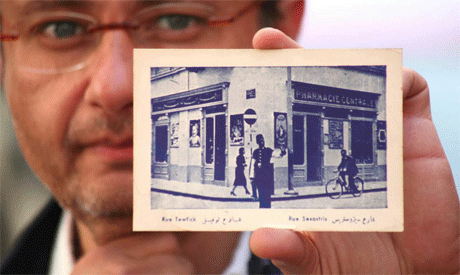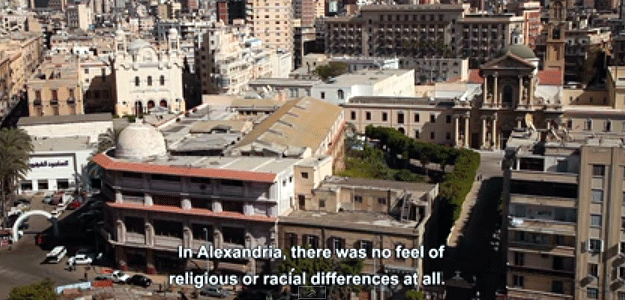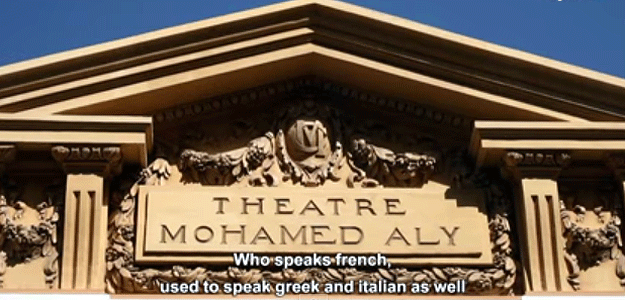
Sherif Fathy Salem, director of 'that Alexandria' with an old photo of a crossroad between Sesostris street and Tawfik street, Alexandria, Egypt. (Photo: courtesy of the filmmaker)
What defines a city, how is a city created and what gives a city its identity are all questions posed in 'that Alexandria,' the latest documentary by filmmaker Sherif Fathy Salem, which was screened at the American University in Cairo's Ewart Hall on 29 January.
As the title suggests, the documentary refers to the city of Alexandria, yet not any Alexandria. It is "that" Alexandria; a certain Alexandria that only lives in the fragmented memories of its inhabitants; an Alexandria long gone yet leaving behind traces of its existence. Some streets, old buildings, signs in different languages still stand in evidence of the past. But they are almost all faded and worn out.
“I’ve loved Alexandria since the first time I went for a visit,” Salem told Ahram Online. “I was seven years old and I was amused by the names of the shops and the architecture.”
“Alexandria has a spirit. You walk down Attarin Street, or Foad Street, and you feel this spirit. It even has a smell of its own.”
Alexandria, a true cosmopolitan hub back then, encompassed inhabitants from Greece, Italy and Armenia. Schools and clubs were built for each of these communities. However, cultures were not closed in upon themselves; there abounded a sense of tolerance and immigrants were immersed within Egyptian society.
Alexander the Great believed that the main reason for wars was peoples' different cultures, so he wanted to create a city in which different cultures mingled and became one. This ideology was the core of Alexandria, which he had visualised but never saw realised.
“When I was a kid I would play with kids with other backgrounds,” says one of the interviewees in the documentary. “Each one would speak a different language. A typical foreigner my age in Alexandria knows four or five languages without any schooling.”

(Photo: still from 'that Alexandria' film trailer)
Another interviewee living in the Attarin district recounts an amusing story on religious tolerance. His mother had several babies who died at birth, so when the fourth one was born on 25 December, her neighbour, a Christian woman, suggested that she name him Eissa, the Arabic name for Jesus. When he survived, she named her next son Moussa (Moses) and her third son Mohamed.
Salem is intrigued by the relationship of East and West and the influence that cultures have on one another and a person’s identity in relation to these factors. These themes are also explored in his other documentaries, 'The Traces of the Sicilian Muslims,' 'The Italians of Egypt’ and ‘The New Italians.'
He believes that Alexandria’s model is far more enriching than current cosmopolitan cities.
"The Alexandrian model is unique," he said. "The idea of the melting pot, like Paris or New York, where an Algerian becomes a Parisian when he goes there, is not that good, because people will try to find this identity in religion.”
The theme is explored further in his documentary 'The New Italians.' The second generation of Egyptian immigrants in Italy suffered an identity crisis and reverted to religion.
"Currently young Egyptians are between two extremes. They’re either too Americanised or are going to the direction of religious extremism," Salem comments.
“I want young Egyptians to know more about their roots. There needs to be a national project to spread awareness about history and identity. We are Pharaohs, Copts, Muslims, Arabs and Mediterraneans.”
There seems to be a sense of loss in 'that Alexandria,' a desperate attempt to revive what is left from a glorious past. It is no wonder that the city has enchanted travellers, writers and filmmakers through history. In the documentary, English literature professor Sahar Hammouda contemplates whether the myth of a city is what creates its authors, or if authors create the myth of a city.
Alexandria is the inspiration of Youssef Chahine’s most important works, Ibrahim Abdel Meguied’s trilogy, Lawrence Durell’s Alexandria Quartet and Cavafis’s poetry.
The astronomer Carl Sagan described its once majestic library as “the brain and glory of the greatest city on the planet Earth.” In the first episode of his famous Cosmos series he stands in an abandoned cellar, recounting what that rubble had once been.

(Photo: still from 'that Alexandria' film trailer)
“If I could travel back in time this is the place I want to visit,” Sagan says while standing in a mockup version of the ancient Alexandria Library. “Here began the intellectual adventure that has led us into space.”
What led to the destruction of that "age of enlightenment" in Alexandria was the ignorance of the masses and the rise of religious fanaticism. The glorious library was torn down, taking with it a massive amount of valuable works of science, philosophy and literature. One of the most brutal stories of that era is the flaying of the highly intellectual mathematician, scientist and philosopher Hypatia by religious fanatics.
Salem argues that the same reason is why Alexandria is currently losing its cosmopolitan identity.
“Alexandria started losing its identity in the mid-seventies. Cinemas became marriage halls, and the famous Rialto Cinema was demolished in 2013.”
“Both state-owned and privately-owned mass media outlets increase ignorance. They don’t fulfill their roles of enlightening the masses.”
“You look at the television now and what it is airing — it is filled with talk shows talking about current affairs in a superficial manner. Not one Egyptian channel airs documentaries,” he said. “Culture is the solution, or even knowledge.”
However, Salem is not pessimistic. When his film premiered earlier in Alexandria, 500 people attended, with the majority of people in their twenties. After the screening, many young people came to him and wanted to know more about the Greek and Armenian communities; they wanted to visit their clubs and meet them.
Last week, Salem held a five-day documentary workshop with ONA Academy and Deutsche Welle, in which he instructed eight young filmmakers.
“They were wonderful filmmakers,” he said. “In five days we produced eight documentaries. They were all stories from Falaki Square. Each had a different idea. One looked at the architecture of the place, another explored Bab El-Louk souq. The idea was to explore one place and tell different stories about it.”
Through his work Salem wants to urge people to know more about their history, to stimulate people to protect what’s left of the monuments and historical buildings around them, that are slowly being demolished, and to revive an interest in walking and looking.
Short link: